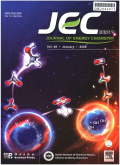- 钛学术文献服务平台 \
- 学术期刊 \
- 工业技术期刊 \
- 石油与天然气工业期刊 \
- 能源化学期刊 \
Pt-Sn clusters anchored at Al3+penta sites as a sinter-resistant and regenerable catalyst for propane dehydrogenation
Pt-Sn clusters anchored at Al3+penta sites as a sinter-resistant and regenerable catalyst for propane dehydrogenation
基本信息来源于合作网站,原文需代理用户跳转至来源网站获取
摘要:
Pt-based catalysts are widely used in propane dehydrogenation reaction for the production of propylene.Suppressing irreversible deactivation caused by the sintering of Pt particles under harsh conditions and regeneration process is a significant challenge in this catalyst.Herein,a series of highly ordered meso-porous Al2Os supports with different levels of Al3+penta sites,are fabricated and used as the support to dis-perse Pt-Sn2 clusters.Characterizations of Pt-Sn2/meso-Al2O3 with XRD,NMR,CO-IR,STEM,TG,and Raman techniques along with propane dehydrogenation-regeneration cycles test reveal the structure-stability-re generability relationship.The coordinatively unsaturated pentacoordinate Al3+ (Al3+penta) can strongly anchor Pt atoms via a formation of Al-O-Pt bond,and thus stabilize the Pt-based particles at the surface of Al2O3.The stability and regenerability of Pt-Sn2/meso-Al2O3 are strongly dependent on the content of Al3+penta sites in the Al2O3 structure,and a high level of Al3+Penta sites can effectively prevent the agglomeration of Pt-Sn2 clusters into large Pt nanoparticles in the consecutive dehydrogenation-regeneration cycles.The Pt-Sn2/meso-Al2O3-600 with the highest level of Al3+penta (50.8g) delivers the best performance in propane dehydro-genation,which exhibits propane conversion of 40% and propylene selectivity above 98% at 570 ℃ with 10 vol% CaH8 and 10 vol% H2 feed.A slow deactivation in this catalyst is ascribed to the formation of coke,and the catalytic performance can be fully restored in the consecutive dehydrogenation-regeneration cycles via a simple calcination treatment.

推荐文章
Pt-Sn/CCA催化剂性能及结构表征
脱氢
催化剂
低温
活性
稳定性
Li改性的Pt-Sn催化剂催化醋酸直接加氢制乙醇
Li改性
Pt-Sn催化剂
醋酸
加氢
乙醇
酸性位
二氯乙烷氧氯化再生丙烷脱氢Pt-Sn/Al2O3催化剂的性能研究
丙烷脱氢
二氯乙烷
Pt-Sn/Al2O3催化剂
再生
醋酸加氢Pt-Sn双金属催化剂制备乙醇研究
醋酸
加氢
乙醇
Pt-Sn催化剂
内容分析
关键词云
关键词热度
相关文献总数
(/次)
(/年)
引文网络
引文网络
二级参考文献 (0)
共引文献 (0)
参考文献 (0)
节点文献
引证文献 (0)
同被引文献 (0)
二级引证文献 (0)
2022(0)
- 参考文献(0)
- 二级参考文献(0)
- 引证文献(0)
- 二级引证文献(0)
引文网络交叉学科
相关学者/机构
期刊影响力
能源化学
主办单位:
中国科学院大连化学物理研究所
中国科学院成都有机化学研究所
出版周期:
双月刊
ISSN:
2095-4956
CN:
10-1287/O6
开本:
出版地:
大连市中山路457号
邮发代号:
创刊时间:
语种:
eng
出版文献量(篇)
2804
总下载数(次)
0
总被引数(次)
7996
期刊文献
相关文献
推荐文献
- 期刊分类
- 期刊(年)
- 期刊(期)
- 期刊推荐
一般工业技术
交通运输
军事科技
冶金工业
动力工程
化学工业
原子能技术
大学学报
建筑科学
无线电电子学与电信技术
机械与仪表工业
水利工程
环境科学与安全科学
电工技术
石油与天然气工业
矿业工程
自动化技术与计算机技术
航空航天
轻工业与手工业
金属学与金属工艺
能源化学2022
能源化学2021
能源化学2020
能源化学2019
能源化学2018
能源化学2017
能源化学2016
能源化学2015
能源化学2014
能源化学2013
能源化学2012
能源化学2011
能源化学2010
能源化学2009
能源化学2008
能源化学2007
能源化学2006
能源化学2005
能源化学2004
能源化学2003
能源化学2002
能源化学2001

 免费查重
免费查重










